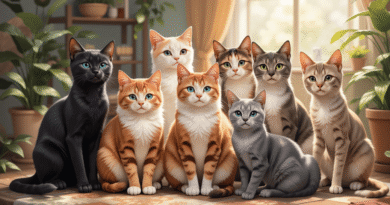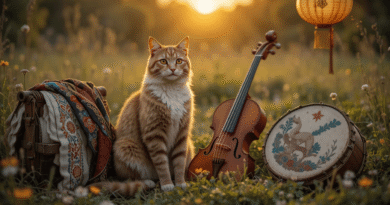Choosing the Right Cat
Choosing the right cat involves more than just picking the cutest kitten. Cats have diverse personalities, health requirements, and energy levels. Understanding these traits can help you make an informed decision. This guide will explore scientific studies on cat behavior, health factors, and breed differences to help you choose the ideal feline companion.
Understanding Cat Behavior and Temperament
Cats vary greatly in temperament. Genetics, early experiences, and breed-specific traits play significant roles in shaping their behavior. According to research, socialization during the first few weeks of life significantly affects how cats behave. Kittens exposed to humans and other animals early on tend to be more sociable and adaptable. However, cats with less human interaction during this critical period may grow up shy or fearful.
Some breeds are more predisposed to certain behaviors. For instance, Siamese cats are known for their vocal and demanding nature. They form strong bonds with their owners but require more attention. On the other hand, breeds like the British Shorthair are generally calm and independent, making them a good choice for those who prefer a more relaxed pet.
Health Considerations for Cat Breeds
Not all cats are created equal when it comes to health. Purebred cats are often more prone to certain genetic conditions due to selective breeding. For instance, Persian cats often suffer from respiratory issues due to their flat faces, a condition known as brachycephaly. Maine Coons, a large breed, are susceptible to hip dysplasia, a condition affecting their joints.
On the other hand, mixed-breed cats, often referred to as domestic shorthairs or longhairs, generally have fewer genetic health issues. Their diverse gene pool provides more resilience against inherited diseases. When choosing a cat, it’s crucial to consider potential health problems associated with specific breeds. Consulting a veterinarian or doing genetic testing can help identify risks early.
Activity Levels and Space Requirements
Different cats have different energy levels. Some are highly active and need regular playtime and exercise. Others are content lounging around. Scientific studies indicate that breeds like Abyssinians and Bengals are extremely energetic. These cats thrive in environments where they have plenty of toys and space to explore. They also benefit from interactive play with their owners, as it stimulates their minds and prevents boredom-related behavior problems.
If you live in a smaller space, a less active breed may be a better fit. Cats like the Ragdoll or Scottish Fold are known for their calm demeanor. They tend to adapt well to indoor living and are less likely to become stressed in confined environments.
Grooming Needs
Cat grooming requirements vary depending on the breed and coat type. Long-haired cats, such as Persians and Maine Coons, require frequent grooming to prevent matting. Neglecting grooming can lead to skin infections and discomfort. Studies show that regular grooming not only keeps their coat healthy but also reduces shedding and the risk of hairballs.
Short-haired cats, like the Siamese or Burmese, require less maintenance. A quick brush once a week usually suffices. However, even short-haired cats benefit from regular grooming, as it helps maintain skin health and reduces allergens.
Allergies and Cats
Cat allergies are a common concern for prospective pet owners. Cat allergens are primarily found in saliva and skin secretions. Some studies suggest that certain breeds, like the Siberian, may produce fewer allergens. However, no cat breed is truly hypoallergenic. Regular cleaning, vacuuming, and using air purifiers can help reduce allergen levels in your home.
If allergies are a concern, consider spending time with the breed you’re interested in before bringing one home. This can give you an idea of how severe your allergic reaction might be. Consulting an allergist is also a good step if you’re unsure.
Cat Age: Kitten vs. Adult
Deciding between adopting a kitten or an adult cat can affect your experience as an owner. Kittens are energetic, playful, and require a lot of time and training. They need to be litter trained and socialized, which demands effort and patience. However, kittens adapt quickly to new environments and can form strong bonds with their owners early on.
Adult cats, on the other hand, come with an established personality. You’ll know whether they’re shy, outgoing, or relaxed. They are usually litter trained and may need less time to adjust to a new home. Research suggests that adopting an adult cat can reduce the likelihood of behavioral issues, as their personality is already set.
Compatibility with Other Pets
If you have other pets, choosing a cat that can get along with them is essential. Cats are territorial creatures, and introducing them to a home with other pets needs to be done carefully. Some breeds, like the Ragdoll or the Birman, are known for their sociable and friendly nature towards other animals. They tend to get along well with dogs and other cats.
On the flip side, certain breeds are more independent and may not tolerate the presence of other animals. Introducing a new cat should be done gradually. Allowing the animals to get used to each other’s scent before face-to-face interaction can help ease tension.
Lifespan and Commitment
Cats are a long-term commitment. On average, they live for 12 to 15 years, but some breeds, like the Burmese and the Siamese, can live well into their twenties. It’s essential to consider your long-term lifestyle before adopting. A cat’s needs may change over time, requiring adjustments in diet, healthcare, and living conditions.
Choosing the right cat involves understanding breed-specific traits, health considerations, and compatibility with your lifestyle. Taking a scientific approach helps ensure that the cat you choose will thrive in your environment and live a healthy, happy life. Whether you’re looking for an energetic companion or a calm lap cat, making an informed decision will result in a lasting bond with your feline friend.







